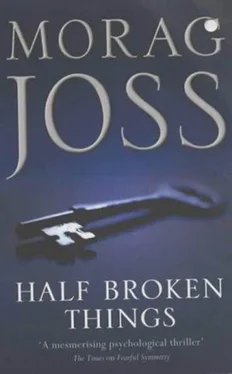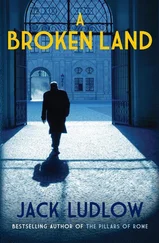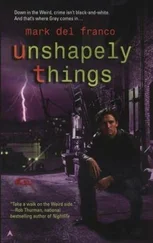Morag Joss - Half Broken Things
Здесь есть возможность читать онлайн «Morag Joss - Half Broken Things» весь текст электронной книги совершенно бесплатно (целиком полную версию без сокращений). В некоторых случаях можно слушать аудио, скачать через торрент в формате fb2 и присутствует краткое содержание. Жанр: Детектив, на английском языке. Описание произведения, (предисловие) а так же отзывы посетителей доступны на портале библиотеки ЛибКат.
- Название:Half Broken Things
- Автор:
- Жанр:
- Год:неизвестен
- ISBN:нет данных
- Рейтинг книги:3 / 5. Голосов: 1
-
Избранное:Добавить в избранное
- Отзывы:
-
Ваша оценка:
- 60
- 1
- 2
- 3
- 4
- 5
Half Broken Things: краткое содержание, описание и аннотация
Предлагаем к чтению аннотацию, описание, краткое содержание или предисловие (зависит от того, что написал сам автор книги «Half Broken Things»). Если вы не нашли необходимую информацию о книге — напишите в комментариях, мы постараемся отыскать её.
Loners Jean, Micheal and Steph are drawn together to Walden Manor by a mixture of deceit, good luck and misfortune. There, they shape new lives, full of hope and happiness. When their idyll is threatened they discover their new lives are worth preserving. But at what cost?
Half Broken Things — читать онлайн бесплатно полную книгу (весь текст) целиком
Ниже представлен текст книги, разбитый по страницам. Система сохранения места последней прочитанной страницы, позволяет с удобством читать онлайн бесплатно книгу «Half Broken Things», без необходимости каждый раз заново искать на чём Вы остановились. Поставьте закладку, и сможете в любой момент перейти на страницу, на которой закончили чтение.
Интервал:
Закладка:
‘And do, do come back at the end of the week when the vicar’s here!’
‘If I possibly can, I will! Thank you!’
‘Give my regards to Norfolk!’
‘I will!’ And if you say one more word, he thought, beaming at the woman before he turned to go, I shall club you to death.
Michael parked in a lay-by on the edge of Sherston, swiped up the pile of pale green leaflets from the dashboard, wound down the window and pushed them out. He stared at them as they settled and shifted on the ground. The twitch in his face had travelled down to his throat, and he began to cry. The van needed work, the electric bill was overdue and even supposing he could shift the six kneelers straightaway, once he counted in his petrol he would be no better off. He sank his head onto the steering wheel and gulped. He was due back in court tomorrow for falling behind with his fines again, and he had nothing for the arrears. But even that was not the worst of it. The unbearable part was that, despite the practical clothes and the shiny clean hair for today’s little performance, he was not Jeff Stevenson. Once again, inescapably, he was only himself.
On Tuesday, the day after the teapot and Shelley’s telephone call, Jean filled her cardigan pockets with keys and set off round the house. The largest key opened the locked room at the front, which turned out to be a study, not of the proper working kind but with a battered, easy-going air, as if any studying ever done in it had been allowed to evolve in its own fashion. The furniture was comfortably mis-matched, apparently brought in piece by piece and then allowed to stay, however useless it became. One solid mahogany desk had been joined by an oak one, smaller and less attractive, on which stood an ancient IBM golfball typewriter. A four drawer filing cabinet stood next to one of another colour, half its size. There was a computer and printer, and a disconnected fax and answering machine. Next to the computer squatted an old adding machine, and behind the cordless telephone sat a white plastic one with a round dial.
Jean was not especially curious about what business might have been conducted here, but it seemed to her, peering at the shelves of Cricketers’ Almanac, the stacked software boxes with titles such as Mensa Ultimate Challenge and British Plant Guide, that it was less than all-absorbing, and perhaps indistinguishable from recreation. Quite possibly no business at all, in the commercial sense, but only household matters were run from here. She looked round blandly. All offices and businesses were, in the end, the same to her. She had worked in several, the last in 1984, when she had left just in time to avoid having to grapple with word processing. Work in offices bored her and always had: all it ever came to was the talking, typing, sending, filing of what were in the end just words and numbers. The people around her had seemed unaware of the futility of what they did all day, so she had learned to keep her mouth shut, do what was expected of her and look as if she gave a damn. But it amazed her. The wonder of offices, she felt, was that so many people could waste so much of their lives in them and think their time well spent.
Two of the newest and smallest keys opened the filing cabinets. Jean flicked through the folders in the top drawer, marked with names such as Current Account 1, 2 and 3, Telephone, Insurance (Buildings), Insurance (Contents), Appliances, Oil, Electricity, Pool, Suppliers: Various. In the lower drawers the first few files were labelled Bonds, Deeds and Inland Revenue . Jean could not be bothered to look further. It was all financial or legal stuff, statements and accountants’ letters about trusts, investments and so on, and a lot of correspondence with some firm called Sadler Byng & Waterman who called themselves Independent Financial Advisers. Jean closed the drawer. It was sure to be disappointingly mundane in the detail, even if she were ready to make the effort to understand it. If she found herself at a very loose end some wet afternoon she might come up here and take a proper look. Before she left the room she checked that the computer and fax were indeed unplugged, but noted reproachfully that the old electric typewriter on the oak desk by the window was not. She left it as it was.
She tried another of the large keys in the carved door at the end of the main landing. It turned. The door opened with a sigh of its hinges, and showed to Jean- as if a curtain had been raised on a scene from a glamorous play- a room so light, pristine and pale that she felt immediately dirty and unworthy. She hesitated, finding it necessary to gaze from the doorway as if to check that the room was indeed empty; for something inside, something surely alive though not human, was beckoning to her. She stepped out of her shoes and walked in, where the perfection of the room expanded and grew inclusive. As she moved, she stirred the trapped smells of dry grass, clean cotton and lemon oil, which now began to animate and scent the air she breathed. With every step across the white carpet she summoned magic; she was rousing spells long asleep in the stillness. Moving from window to window she looked out at the dank gardens and then back, trying to accustom herself to the changed picture that she must make, framed by the room. Slowly she grew used to the thought that now she was in the room she was also of it, transformed from the sneaking outsider on the threshold into the perfect room’s perfect occupant. She looked round at the pattern of faded flowers on the thick curtains, the soft carpet and green rugs, the bleached stone fireplace and the silver candlesticks on the mantelpiece. They seemed to be congratulating her on her safe arrival; they breathed their acceptance and conferred their brightness upon her. Jean sat down on the edge of the large bed, then slid into the centre of it and stretched out. The room was cold, and at once the goose-down quilt beneath her grew warm and nest-like. She lay and allowed something that felt very like happiness to lap through her, wondering if this feeling might be the live thing that she had sensed in the room as she had stood on the threshold. But then, had she not herself brought the feeling with her into the room? She lay smiling, pleasantly unsure whether she were the giver or recipient.
Later, she wandered into the dressing room, where she found that the wardrobes, which lined three walls, still had keys in their doors. Opening one, Jean was dismayed that the full-length mirror on the inside should so nearly spoil things. It showed her that she did not, after all, quite perfectly belong; in her heavy skirt and cardigan she was the only dark thing in the room and was not merely dark, but a muddy, lilac dark. But that she should now be shown this was a kindness, really, in the manner of the room’s many kindnesses, because the door’s swinging open like that and offering Jean her own reflection was revealing also the most obvious and natural solution. The wardrobe was full of women’s clothes, most of them hanging from silk padded hangers. Jean counted eight cashmere twin sets and perhaps ten skirts, several blouses of white and cream silk and linen, at least a dozen striped and plain cotton shirts. The drawers alongside held trousers, heavy sweaters, belts, scarves, underwear. Behind the next door hung suits and dresses. For many years Jean had bought clothes of the better sort second-hand, from discreet little places invariably called ‘dress agencies’. She had almost developed the necessary blindness to evidence of previous ownership that was betrayed by a slightly bagging skirt, an armpit crease, a curl in a lapel. But nearly all of the clothes in these wardrobes had been so little worn that it was like staring at shop rails. They had the pleasantly impersonal, un-owned look of clothes in the classic English style- yet they might be, Jean thought, biting her lip, just slightly too young and daringly coloured for her. Or perhaps, she thought, with a nip of elation that the prospect of new clothes had not induced in her for three decades, perhaps only too young and daringly coloured for her current view of herself, which now seemed, suddenly, unduly and unnecessarily depressed. The dark figure she had seen reflected in the long mirror was already an embarrassment, a mystifying guest who had turned up uninvited and looking all wrong. As she sifted along the rails she began to see that really, the clothes were actually already hers and always had been; it was only she who had strayed from herself. These clothes would restore her to her proper self- the version of herself that she and other people had mislaid so long ago that everyone had ceased to notice that the dark, muddy Jean who had been going about in her place was the wrong one. The real, elegant, cared-for Jean had been found, and now she was burning to get out of the wrong clothes and prepare herself for the right ones. Turning carefully away from the reflection she undressed and slipped on a long dressing gown of cream alpaca.
Читать дальшеИнтервал:
Закладка:
Похожие книги на «Half Broken Things»
Представляем Вашему вниманию похожие книги на «Half Broken Things» списком для выбора. Мы отобрали схожую по названию и смыслу литературу в надежде предоставить читателям больше вариантов отыскать новые, интересные, ещё непрочитанные произведения.
Обсуждение, отзывы о книге «Half Broken Things» и просто собственные мнения читателей. Оставьте ваши комментарии, напишите, что Вы думаете о произведении, его смысле или главных героях. Укажите что конкретно понравилось, а что нет, и почему Вы так считаете.












